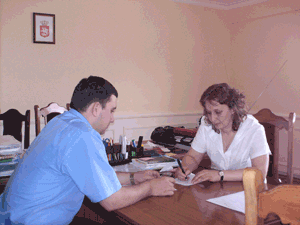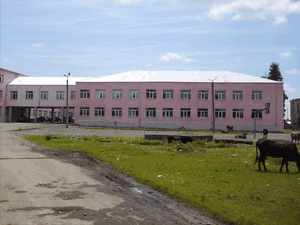 Nana Pazhava, Zugdidi
Nana Pazhava, Zugdidi
There exists a controversy between the lecturers and interim rector of the Zugdidi Shota Meskhia State Institute, which resulted from a stiff competition for academic positions at the institution of higher education. The professors feel that they have been swindled out of academic positions by the terms of the competition having been changed midway. Consequently they have since filed complaints against Teona Khupenia to the Georgian Parliament, president’s chancellery and the Georgian Ministry of Education and Science. They hold Khupenia, the interim rector responsible for having conducted an illegal competition. The terminated and not rehired professors are now demanding that responsible institutions react to the violation that their labor and academic rights be protected.
Zugdidi Branch of the Tbilisi Ivane Javahishvili State University was closed down after its ten years of existence and it ended with serious arguments in 2007. Then, nearly 1,800 students and 200 lecturers unsuccessfully protested over the closure of Zugdidi’s University. However, in spite of all their efforts, the Ministry of the Education did give its decision was not reversed or changed. Nevertheless, in place of the university a new institution of higher education was immediately established in Zugdidi last year. Zugdidi Lyceum and Senaki Agricultural Institute were then joined with the new institute. The Zugdidi State Institute then started its operations in the former public school # 5 in the city of Zugdidi.
Teona Khupenia acted as interim rector of the former university and now she holds the same position again. Murman Papashvili, former rector of the closed down Zugdidi branch of the Tbilisi State University was imprisoned for having misused his power.
There has been a controversy between the institute’s  administration and lecturer, which started after the abolishment of the branch. Both professors and the majority of the local population considered to have been insulted as nobody wanted Zugdidi to be without an institute of higher school. Furthermore, the slogan of the Georgian president - “Zugdidi must turn into a University City” was much proclaimed by the government during the election period.
administration and lecturer, which started after the abolishment of the branch. Both professors and the majority of the local population considered to have been insulted as nobody wanted Zugdidi to be without an institute of higher school. Furthermore, the slogan of the Georgian president - “Zugdidi must turn into a University City” was much proclaimed by the government during the election period.
Guram Kvikvinia, associated professor: “A higher educational institute had the same function as does a college. Not only professors and students but parents also protested the abolishment of the university. 113 out of 1,750 students were IDPs, Many were in the fourth year of study and there were also students from lower courses who had there education interpreted. They have since been divided among various institutions to complete their programs of study. Many of them could not continue studies. Khupenia was the one who was responsible for having initiated everything and that the university was closed in Zugdidi.”
Under such circumstances, the interim rector abolished the faculties of psychology and philosophy and eight professors were fired. However, the human resource decision was not done in a way that was understandable, and as a result the professors appealed their firings to a court of law. However, to make a long story short, the protracted trials ended with failure. Among the terminated professors, only Rezo Gulua was reappointed to his old position. The appeals of other seven lecturers were discussed at Kutaisi Appeal Court but the verdict was not made in their favor.
Kote Chikobava, associated professor of Philosophy: “We were fired in a mysterious way. Teona Khupenia wrote a resolution about our resignation on October 20 but we were only able to obtain the document on November 30, and only after a serious struggle in obtaining it. We demanded compensation for one month but nobody was concerned to provide this to us. And even before, Tbilisi State University proceeded to select 33 academic personnel, and this was based on a competition, and then the new staff was granted the authority to go about electing the new rector. We collected signatures; 27 out of 33 professors supported Otar Guguchia; Khupenia was not a professor and she under the rules she could not be elected as a rector.”
Guram Kvikvinia: “According to the Article 87 of the Law on Education rector of any institution of higher education shall be a professor. Khupenia did not have even a doctor’s degree. Mikheil Saakashvili was also deceived when he signed the resolution allowing for Khupenia’s appointment as the rector. Later, the representatives of the Ministry of Education and Science stated that the resolution must be annulled; but apparently Khupenia has well-placed protectors in the government and she continued to hold onto her position.”
Another wave of controversy started when according to the results of competition for academic positions in the institute famous professors remained unemployed. They blame Teona Lhupenia for having participated in illegal activities. However, in spite of their allegations and recriminations, the interim rector claims their accusations are groundless and without merit.
Teona Khupenia: “If the competition was illegal then why did they participate in it?! In any event, if they fully participated, which indicates that they have considered it to have been legal, and consequently their later filed complaints about the jury members appears to be out of the ordinary. I invited competent people from various institutions to participate in the selection committee to fill the positions. The competition was completely legal, and until such time as a rector is elected, and in the interim till management bodies are established, all structural changes are regulated by president’s resolution # 473, which is to be implemented by the interim rector.”
Professors state that nobody doubted about the legality of the competition at first but it was clear with the unfair results that something was not right and there was a need to closely investigate the competition activities in details. It was then clear that the topic was not only one for closer inspection on procedural grounds but also that some aspects of possible criminal offense were apparent, which would merit the need to carry out an investigation.
Zeinab Saria, associated professor of Philology: “Competition must not be carried out during the reorganization period because the statute of the institute has not yet been determined. The institute remained without a rector, and during this period the conditions needed to selection a new one was to have been worked out. Despite that, the commission held a meeting on June 10, 2008 and made a decision based on regulations enacted by the Zugdidi higher educational institution under the name of a state body. The Georgian Law on Public Legal Entity had been violated, and more precisely, the law claims that the legal entity is originated and granted with the status of legal entity only after its statute is enacted and an authoritative person representing the legal entity selected. Here, they have neither statute nor an authoritative representative. Consequently, Zugdidi Institute does not have statute of legal entity and as a result, it is illegal to make decisions in its name. That’s why the competition documents had two seals on the documents that provided for the establishment and another for setting up the institute. Thus, it appeared as if they wanted to cheat all of us.”
Tite Mosia, full professor of Phylology: „ Apart from breaking the law, the comission did not meet the requirement of the Law on Education, which means that the commission did not held the publicly open and transparent competition with the staff and students participating in the decision making process. It is inadmissible to limit the principle of not involving the public in the process. In this particular case, the names of commission members and their work was totally clandestined. The requirement under the law is to hold publicly open competition and this rule was broken.“
Moreover, the professors further claim that the competition was held earlier the fixed date for the competition and that contest rules were violated. The professors indicate that the competition should have been held after June 22 and not earlier.
Guram Kvikvinia: “The information on competition was first published on April 22nd in newspaper 24 Saati (24 Hours). Officially, it should not have been held until June 22. Apparently, Teona Khupenia was in a hurry. Therefore, she held the competition, which was more like an interview then a real open competition on June 10. Khupenia invited the representatives of Sokhumi, Telavi and Tsnori undergraduate institutions to serve as commission members at her own initiative. The majority of commission members were from Tsnory College. The total number of members was 5 and members from Tsnory occupied 3 seats on the commission. The head of the commission was from Tsnori as well. Apparently, it was easier for her to exert her influence in their decisions.
The professors also say that the open vacancies were changed arbitrarily. In particular, on the history faculty, there were two vacancies: one for associated professor and one for professor- assistant. However, in the final decision two associated professors prevailed in the competition for the faculty positions. The faculty of Georgian Language and Literature was replaced by the faculty of Philology. Moreover, the professors allege that Teona Khupenia used this trick to push aside any an all rivals that could have stood in her way of obtaining a position of a full professorship.
However, Teona Khupenia is convinced that she is most competitive and competent. She says she can give all necessary documents to justify her activities (in terms of the faculty selection process).
Teona Khupenia: “I personally, did not want to dismiss anyone. It was the commission’s decision. In the second round of the competition, it was very important to show the knowledge of the current educational reforms, ability to make programs competitive, which includes the incorporation of logical thinking and developing the ability to expressing idea concisely. The current reforms in the field of education forces us to create a competitive environment. All priorities were set by the administration of the institute, and this was based on the needs of the institute. If someone did not meet the competition requirements, it does not necessarily mean that the interim Rector was violating someone’s rights.”
Taking into account the current difficult situation, it is doubtful that the majority of professors will vote for Teona Khupenia on approaching rector’s elections. She had been considered as an inappropriate candidate, even in the position of an interim rector. “Khupinia did not occupy any academic position. She was known in the staff as a low qualified worker always avoiding to take part local academic conferences. Moreover, her scholarly and cultural dossier remains limited,” claim disgruntle and terminated professors.
The actual date for the election of the Zugdidi University rector has not been set so far. However, it is obvious that another argument in Zugdidi State Institute is inevitable; the topic of higher education and the accompanying reforms, in practice, is going to be a contested issue for sometime to come.



